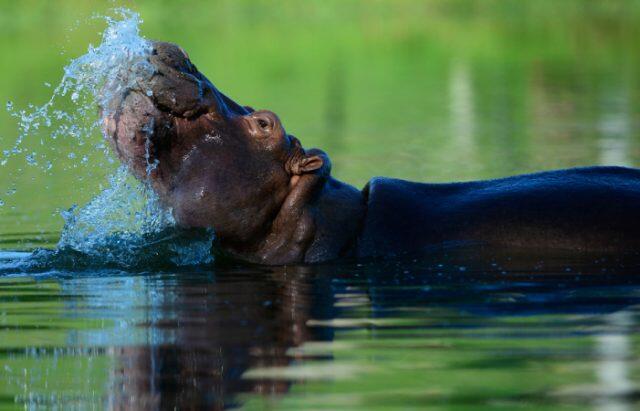More than 20 years after Colombian drug lord Pablo Escobar died in a gunfight with police, a strange legacy survives him: His pet hippos.
Look out of the window in the dead of night in the village of Doradal and you may see one plodding down the street.
Police killed or locked up Escobar’s drug gang, but not the hippos in his private zoo.
Left to themselves on his Napoles Estate, they bred to become what’s said to be the biggest wild hippo herd outside Africa — a local curiosity and a hazard.
“I was going to football training this morning about 6:30 and there was one in the meadow, opposite the school,” says Lina Maria Alvarez, 12.
Just outside the village, Diego Alejandro Rojas, 19, shines a flashlight on a black mass grazing among the tall grass. Its eyes catch the light and shine like glowworms.
“They come from the Napoles Estate along the canal after nightfall,” Rojas says.
“They are like the village pets. I’m more afraid of the snakes than the hippos.”
David Echeverri Lopez, a biologist from the regional environmental corporation Cornare, says it is the biggest herd of wild hippopotamuses outside of Africa.
The have thrived in this green spot in northern Colombia, but Echeverri warns they are a hazard for the local area and its environment.
They break fences and defecate in the rivers.
“This is a paradise for them,” said local veterinarian Jairo Leon Henao.
“They have no predators so they are more at peace than they would be in their natural habitat and they have been reproducing faster.”
Escobar bought four hippos from a zoo in California and flew them to his ranch in the early 1980s, Echeverri says.
He now estimates there are about 35 in the area.
Doradal and the Escobar’s old ranch lie 190 kilometers from the city of Medellin, which gave its name to his cartel.
Escobar was one of the richest and most powerful criminals ever. His racket grew into a multi-million dollar business that dominated the cocaine trade and was blamed for numerous killings.
Like his gang, hippos can very fierce, naturalists say.
“If they get aggressive they pose a risk to Colombian biodiversity. They could displace native fauna” such as otters and endangered manatees, Echeverri says.
“It is an invasive species and very resistant to everything. They carry diseases that can kill livestock,” Echeverri says, standing by the lake at Hacienda Napoles, where hippos’ giant snouts and ears poke out of the water.
Since hippos can live for up to 60 years, authorities are seeking a way to manage the herd over the long term.
Costly and tricky attempts to castrate the hippos to curb their spread have not made much progress, Leon says. Only four have had the snip.
So for now, instead of going to war against the hippos as the Colombia police did against their late master, Echeverri and Leon are working just to contain them.
They are building barriers of rocks, trees and wire to keep the hippos from roaming too far, and growing fodder to keep them happy where they are.
Various locals said the hippos seemed peaceful hanging around the village.
“It has become normal to see them around here. It’s like being in Africa. It is a privilege,” said housewife Clara Nunez, 48. “But when one gets close, it is a bit scary.”
Source: AFP











